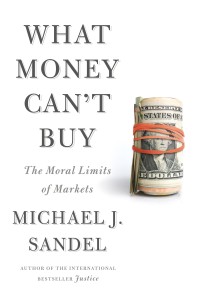What Money Can’t Buy
Written by Ashley Kelmore, Posted in Reviews
Alright, back to the non-fiction books I love. Michael Sandel is a modern philosopher who is interested in issues of justice. In fact, his book “Justice” is a fantastic read for people who are interested in philosophy but cringe at the idea of popping open Hume or Kant on a cold winter’s day.
This book looks at whether there are any moral reasons to not allow the market to ‘take care of things.’ Some of his areas of focus are likely ones that you have considered previously (possibly over a beer with friends). Should people be able to sell their kidneys? Did that student really get into Harvard because of his talent, or because his mom could buy the entire campus twice over? Is that fair? Does it matter if it is or isn’t?
Sandel argues from a premise that some might not accept: that “making markets more efficient is no virtue in itself.” Instead, he’s interested in why people might cringe at the commodification of certain components of our lives. Why, if markets are so great and supposedly will sort out the distribution of goods and services in the most efficient way possible, do some markets make us so uncomfortable?
Each example in the book addresses one of two arguments – the argument from fairness and the argument from corruption. In the first case, we might consider where a certain market is fair if the person participating may not REALLY have much of a choice. Again, think about the kidney example. Sure we all own our bodies, but the concern with allowing a market in kidneys is that only the poor would end up selling them, essentially turning them into spare parts for wealthy people, and leaving people who cannot afford kidneys at the whim of donors. The second argument looks at whether the nature of certain things might be corrupted simply by market involvement. Advertising in schools is a prime example of that.
The book is broken down into five parts – an introduction to the issues he plans to address (and a background on markets and examples of market transactions that might raise an eyebrow), a section on incentives (and how they don’t always work the way you’d think), markets replacing moral discussion, the insurance market (which features my favorite portion of the book, where he examines third-party life insurance purchasing), and the right to name different public and private spaces (think Citibank Field in NYC). The concepts are not difficult to grasp and are well-written and interesting.
While I do have a philosophy background, I want to emphasize that one is not necessary AT ALL to enjoy this book. If you’re interested in markets and a discussion about why they might not always be the best way to distribute goods, this is a really great read for you. In fact, I suggest getting your favorite discussion partner (perhaps someone who doesn’t always agree with you) to read the book at the same time so you can have a lively chat about it all.

